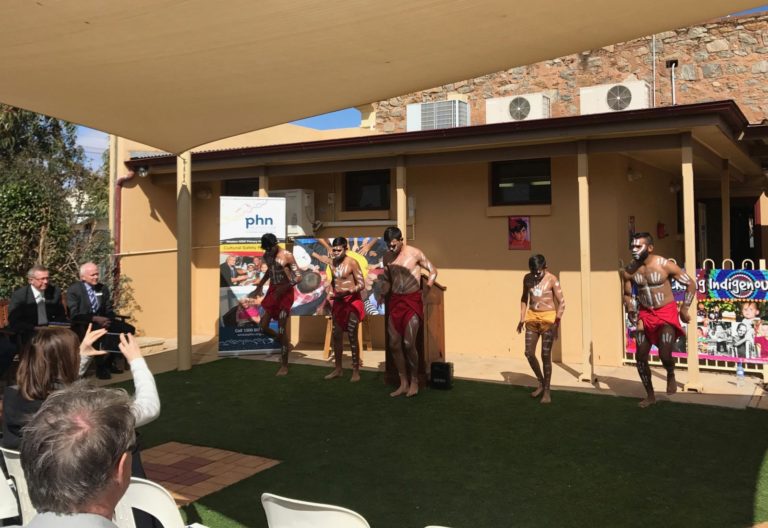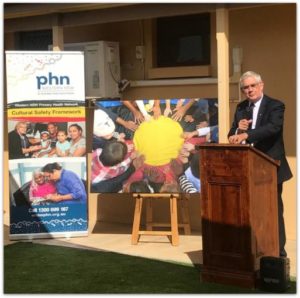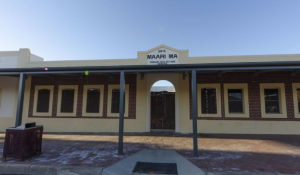Practices in Focus
Maari Ma Aboriginal Health Corporation

Maari Ma Health Aboriginal Corporation (Maari Ma) is an Aboriginal community controlled regional health service located in Broken Hill, a town with a population of 18,000 people located in the far west of New South Wales. Maari Ma offers a myriad of health and support services, focusing on primary health care through a GP-led multidisciplinary team care model.
The primary health care service is arranged into teams:
- Healthy Start and Youth Health (comprising GPs, Aboriginal health practitioners, nurses, midwives, child dental team, speech therapist)
- Keeping Well/Clinic/Community (comprising GPs, Aboriginal health practitioners, nurses, diabetes educators)
- Primary Care Specialist Services (comprising psychologists, mental health/drug & alcohol workers, dietitians, smoking cessation worker), and
- Admin team (comprising a practice manager, clinic coordinator, admin staff and transport officers).
Maari Ma also runs a number of community programs including a youth centre in Wilcannia and an early years project involving early literacy activities in four remote communities, intensive supported playgroups and a discussion group for early childhood education and care professionals in the far west.
Maari Ma has achieved multiple accreditations across the AGPAL Group of Companies, including QIP accreditation against the NSQHS Standards for their dental services, QIC Health and Community Services Standards for the entire organisation, and AGPAL accreditation against the RACGP Standards for their general practice.
In total, Maari Ma has successfully achieved 11 accreditations since 2007, an extremely impressive achievement!
Multiple accreditations against various frameworks has also led to the implementation of a broad-spectrum of continuous quality improvements for Maari Ma which benefit the communities they serve. One initiative of particular significance, backed by the Maari Ma Board, has been a chronic disease strategy: a whole-of-life course approach to addressing chronic disease through delivery of primary care services to the Aboriginal people in far west NSW.
This aims to specifically re-align service delivery to prevent the chronic diseases that have been linked to shorter life expectancies for Aboriginal people, as well as detecting those diseases earlier and managing them better. The Maari Ma’s Chronic Disease Strategy was articulated in 2005 and after ten years of implementation, this work was evaluated and summarised in a two volume report called Opening Doors.
The evaluation was a collaboration between Maari Ma and the Menzies School of Health Research in Darwin, and drawing upon a decade of hospital data held by NSW Health, clinical indicators from quality improvement processes, program administration data and interviews with 68 key informants, taking more than 12 months to undertake and document. The Opening Doors report was launched in celebration during August 2017 by the Hon Ken Wyatt AM MP, Federal Minister for Indigenous Health (pictured below).

The comprehensive report documents key achievements during the Chronic Disease Strategy’s implementation and priorities for further work in the Strategy’s key program areas of Healthy Start for mothers, babies and children, Keeping Well for adults, and health service support. It tracks the evolution of the Strategy from the early days of community engagement and service redesign to the implementation and growth of the programs and the use of quality improvement processes to document changes in clinical outcomes for patients.
Maari Ma CEO Bob Davis believes the work being undertaken as part of the overarching Strategy is of extreme importance and notes that Maari Ma is committed to this for the long haul.
“ When you see a graph of potentially preventable hospitalisations for Aboriginal people for chronic conditions trending downwards, you know you are having an impact. While we still have a way to go on smoking and other lifestyle related problems such as drug and alcohol use, our staff are having conversations with Aboriginal people in the region every day: people who are keen to improve their health, with Maari Ma’s help and support.” – Bob Davis, CEO.
Mr Davis is heartened by the growing number of Aboriginal people across the far west who are accessing their services and are keen to take steps to maintain and improve their health. The role of Maari Ma’s Indigenous staff in supporting the communities of the far west to access services is imperative. They are all role models within their families and communities and have been the backbone of the success of the Maari Ma Chronic Disease Strategy.
Interview
Cathy Dyer, Director of Corporate Services at Maari Ma, spoke with our AGPAL and QIP team, sharing details regarding their multi-accreditation experiences and, community health strategies.
AGPAL Team: Has the accreditation and quality improvement process assisted Maari Ma throughout the Opening Doors Strategy?
Cathy: Maari Ma has taken a continuous quality improvement (CQI) approach to service delivery from the beginning of our chronic disease strategy (CDS), and accreditation was a natural extension of this approach. We started the CDS in 2005, achieved our first accreditation with AGPAL in 2007 and have never looked back.
Maari Ma prides itself on delivering evidence-based best practice primary care services and this is precisely what accreditation and CQI verify: planning, evidence, systems in place, learning from experience and monitoring activity with a view to improving what we do and the outcomes we achieve.

AGPAL Team: How does Maari Ma manage multiple accreditations within the one health service?
Cathy: We tackled our accreditation in stages: AGPAL first, then QIC and then dental. We learned as we went and because it was a shared goal, we made sure we used a team approach so that everyone learns how and why we are doing what we do. This ensures there is a group approach to finding better ways of working and finding solutions to problems.
We have also become a White Ribbon accredited organisation, standing up to address violence against women wherever it occurs. Domestic and family violence is very prevalent in the far west, in both Aboriginal and non-Aboriginal families, and we thought it was important to show our community where we stood as an organisation. We’ve tackled our White Ribbon accreditation in the same way as our others: a shared approach.
AGPAL Team: Can you describe the benefits accreditation against multiple frameworks brings to your organisation?
Cathy: Probably one of the greatest benefits is the way of thinking that becomes embedded in our approach to any problem or circumstance: what is the problem; what are the possible solutions; what information do we need to inform decision making; do we already have this information; if not, how are we going to get it; what documentation or framework is required e.g. Policy, procedure, templates, information gathering, feedback loops to staff, management and the community.
AGPAL Team: The Chronic Disease Strategy indicates a staggering increase in health and specialist checks over the 2011 to 2015 time period, what advice do you have for other health services hoping to better engage their communities?
Cathy: At the heart of everything we do is community. As an Aboriginal community controlled organisation, we exist to serve and support our communities. We are always listening to what services people need: through direct feedback but also because we are living and working in relatively small communities and so our clients are also family and friends so we get a lot of informal feedback as well.
We also try to be open to change and adapt what we do to suit the needs of our clients. We are always open to trying different things: the phrase ‘suck it and see’ has been used more than a few times. We listen, we talk, we plan, we trial, and we review the outcomes. We still have a long way to go to close the gap between Aboriginal and non-Aboriginal people but we try and make a difference every day through the services we provide.



